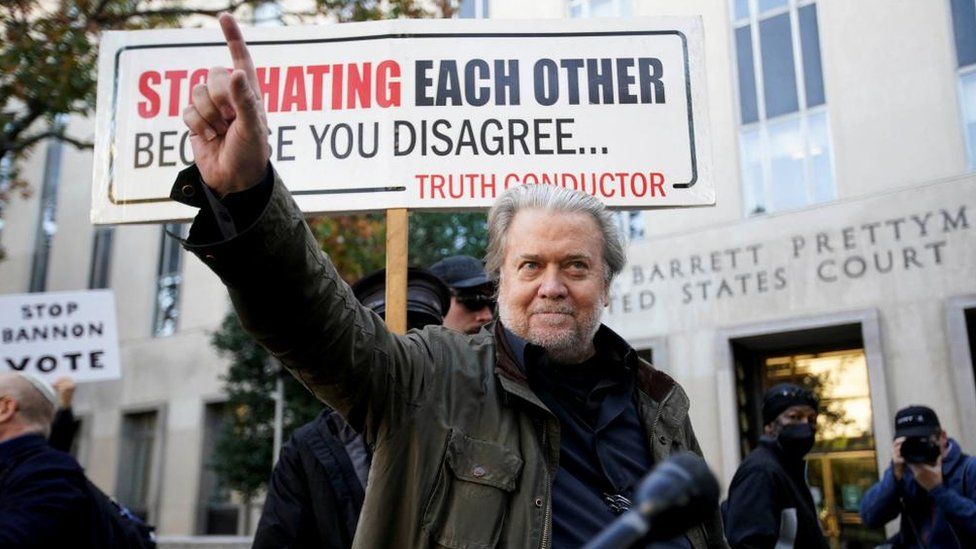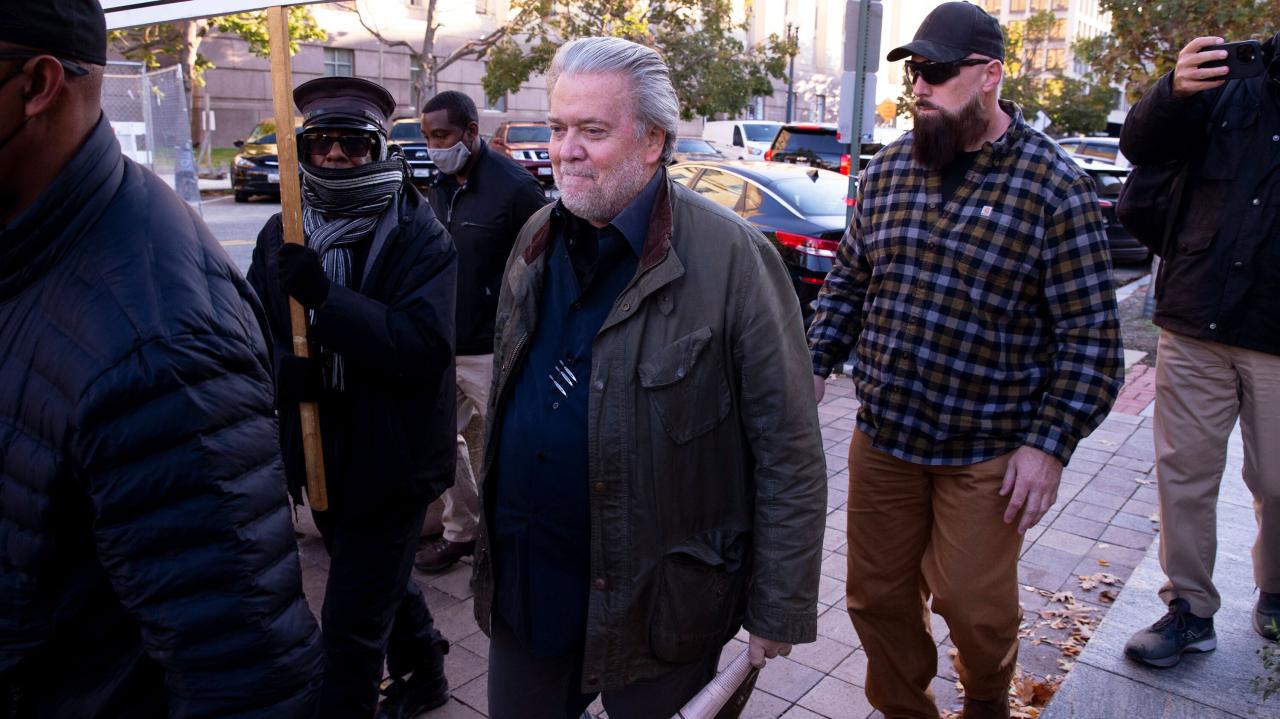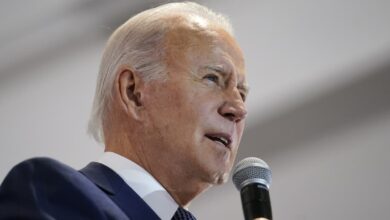
Steve Bannons Prison Sentence GOPs Minority Outreach
Steve bannon must report to prison republicans woo minorities – Steve Bannon’s impending prison sentence and the Republican Party’s simultaneous efforts to court minority voters create a fascinating, and potentially explosive, political cocktail. This isn’t just about one man’s legal troubles; it’s about the image of the Republican Party and its future electoral prospects. We’ll delve into the details of Bannon’s case, examining the charges, the public reaction, and the potential fallout for the GOP.
Then, we’ll explore the party’s outreach strategies aimed at minority communities – a crucial element of their long-term strategy. Finally, we’ll connect these seemingly disparate threads, analyzing how Bannon’s legal battle might impact the Republicans’ attempts to broaden their appeal.
The timeline of events is crucial. From the initial charges to the court’s decision, every step has been heavily scrutinized. We’ll also look at how different factions within the Republican Party have responded, highlighting the internal divisions and the potential for long-term consequences. Beyond the political machinations, we’ll consider the broader societal implications, exploring how this situation shapes public perception and the upcoming 2024 election.
Steve Bannon’s Legal Case and Imprisonment
Steve Bannon’s defiance of a congressional subpoena led to a high-profile legal battle culminating in his imprisonment. This case highlights the tension between executive privilege claims and the power of Congress to conduct oversight investigations. The events unfolded rapidly, generating significant public debate about the rule of law and the limits of political power.
Timeline of Legal Proceedings
Bannon’s legal troubles began with a subpoena from the House Select Committee investigating the January 6th attack on the U.S. Capitol. He refused to comply, citing executive privilege, a claim ultimately rejected by the courts. Following his refusal, the House of Representatives held him in criminal contempt of Congress. The Department of Justice subsequently indicted Bannon, leading to a trial and conviction.
He was sentenced to four months in prison and fined $6,500. His attempts to appeal the conviction were unsuccessful, resulting in his imprisonment. This sequence of events, from subpoena to incarceration, played out over several months, drawing intense media attention and fueling political polarization.
Charges and Court Judgment
Bannon was charged with two counts of contempt of Congress, one for refusing to appear and another for refusing to produce documents. The court found him guilty on both counts, determining that his claims of executive privilege were invalid in this context. The judge emphasized the importance of complying with lawfully issued subpoenas and the serious consequences of defying Congress’s legitimate investigative powers.
So, Steve Bannon’s heading to prison – talk about a dramatic shift in the political landscape! Meanwhile, the situation in Myanmar is equally intense; check out this incredible visualization of the conflict at myanmars rapidly changing civil war in maps and charts to really grasp the scale. It makes you wonder if these seemingly disparate events – Bannon’s legal troubles and Myanmar’s civil war – are connected by some underlying thread of political instability.
Ultimately, both situations highlight the fragility of peace and the persistent power struggles shaping our world.
The sentencing reflected the seriousness of the offense, aiming to deter future similar actions.
Public Reaction to Sentencing
Public reaction to Bannon’s sentencing was sharply divided along partisan lines. Supporters viewed the prosecution as politically motivated, an attempt to silence a prominent conservative voice. Critics, however, argued that the sentence was appropriate and necessary to uphold the rule of law and the authority of Congress. News outlets across the political spectrum covered the story extensively, highlighting the different perspectives and contributing to the ongoing national debate about the January 6th events and the appropriate response to those who resisted the investigation.
So, Steve Bannon’s heading to prison, and the GOP’s trying to court minority voters – a tough balancing act, right? It makes you think about power dynamics in general. This article, a ports strike shows the stranglehold one union has on trade , highlights how concentrated power can disrupt everything. It’s a similar kind of control, just in a different arena.
Ultimately, whether it’s political maneuvering or union leverage, the struggle for power continues to shape our world.
Comparison to Similar Cases
The following table compares Bannon’s case to other high-profile cases involving contempt of Congress. Note that the specifics of each case, including the nature of the investigation and the defendant’s justifications, significantly influenced the outcomes.
| Case | Defendant | Charges | Outcome |
|---|---|---|---|
| United States v. Bannon | Steve Bannon | Contempt of Congress (refusal to appear and produce documents) | Convicted, 4 months imprisonment, $6,500 fine |
| (Example Case 1) | (Defendant’s Name) | (Specific Charges) | (Outcome) |
| (Example Case 2) | (Defendant’s Name) | (Specific Charges) | (Outcome) |
| (Example Case 3) | (Defendant’s Name) | (Specific Charges) | (Outcome) |
The Republican Party’s Response to Bannon’s Imprisonment: Steve Bannon Must Report To Prison Republicans Woo Minorities

Steve Bannon’s imprisonment for contempt of Congress elicited a diverse range of reactions within the Republican Party, highlighting the internal divisions and varying levels of loyalty to the former Trump strategist. While some rallied to his defense, others remained silent or even expressed disapproval, revealing a complex political landscape within the party.The responses to Bannon’s conviction were far from uniform.
So, Steve Bannon’s heading to prison, and the GOP’s desperately trying to court minority voters – a tough sell, given the current climate. It makes you wonder about the anxieties fueling such moves; maybe the recent study showing that handgun owners carrying daily doubled in 4 years study says is a contributing factor to the political unease.
Regardless, Bannon’s legal troubles and the GOP’s outreach strategies are definitely intertwined with broader societal shifts.
A significant portion of the party, particularly those aligned with the Trump wing, offered vocal support or at least avoided explicit condemnation. This reflected a broader trend of prioritizing loyalty to Trump and his allies over institutional norms and legal processes. Conversely, a smaller but notable segment of Republicans, often representing more moderate or establishment wings, either remained silent or subtly distanced themselves, reflecting a concern over the damage Bannon’s actions and subsequent conviction could inflict on the party’s image.
Public Support for Bannon
Several prominent Republicans publicly defended Bannon or minimized the significance of his conviction. This support often stemmed from a shared ideological alignment with Bannon’s populist and nationalist views, or a belief that the prosecution was politically motivated. For example, some Republican lawmakers echoed Trump’s criticisms of the Justice Department, suggesting that Bannon was being unfairly targeted. While specific statements varied, the underlying message often centered on portraying Bannon as a victim of partisan overreach rather than someone who had defied a lawful subpoena.
Criticism of Bannon
While less prevalent, some Republicans criticized Bannon’s actions or expressed concern about the impact of his defiance on the party. These criticisms, however, were often muted and carefully worded, reflecting a delicate balancing act between internal dissent and the need to avoid alienating the Trump base. The lack of forceful condemnation from many high-profile Republicans suggests a strategic calculation to avoid internal conflict and maintain party unity, even at the cost of publicly addressing Bannon’s actions.
Impact on the Republican Party’s Image
Bannon’s imprisonment presented a significant challenge to the Republican Party’s image. The case highlighted internal divisions, raising questions about the party’s commitment to the rule of law and its tolerance of defiance of legal processes. For those who view Bannon as a symbol of populist defiance, his imprisonment might be seen as a badge of honor, strengthening their commitment to the movement.
However, for others, particularly those seeking to broaden the party’s appeal beyond its core base, the case likely presented a public relations challenge, potentially alienating moderate voters and undermining the party’s credibility. The long-term impact remains to be seen, but the case undoubtedly contributed to the ongoing narrative surrounding the Republican Party’s internal struggles and its evolving relationship with the Trump wing.
Republican Efforts to Woo Minority Voters

The Republican Party’s relationship with minority voters has been complex and, at times, fraught with tension. Historically, the party’s platform hasn’t always resonated with minority communities, leading to a significant disparity in voter support compared to the Democratic Party. However, in recent years, the GOP has implemented various strategies aimed at bridging this gap and attracting a larger share of the minority vote.
Understanding these efforts requires examining both their historical context and their contemporary application.The historical relationship between the Republican Party and minority communities is marked by periods of both progress and significant setbacks. While the Republican Party of Lincoln played a crucial role in the abolition of slavery and the granting of civil rights to African Americans, subsequent decades saw a decline in the party’s appeal to these communities.
The Civil Rights Act of 1964 and the Voting Rights Act of 1965, while landmark achievements, also saw a realignment of political allegiances, with many African Americans shifting their support towards the Democratic Party. Other minority groups, such as Latinos and Asian Americans, have also shown a stronger historical preference for the Democratic Party.
Republican Outreach Strategies Targeting Minority Voters
The Republican Party’s outreach to minority voters has involved a multifaceted approach. One key strategy has been emphasizing economic opportunity and individual responsibility. This involves promoting policies that encourage entrepreneurship, job creation, and school choice, often framed as pathways to upward mobility. Another strategy focuses on highlighting shared values, such as faith, family, and community, and presenting the Republican Party as a champion of these values.
Finally, the party has attempted to counter negative stereotypes and perceptions through targeted advertising and community engagement programs. These efforts aim to portray the Republican Party as a viable option for minority voters who may have previously felt alienated.
Comparison of Republican and Democratic Outreach Efforts
The Republican Party’s outreach to minority voters differs significantly from the Democratic Party’s approach. The Democratic Party’s strategy often centers on addressing systemic inequalities and promoting social justice initiatives. This involves advocating for policies such as affirmative action, increased access to healthcare and education, and criminal justice reform. While both parties aim to garner minority support, their messaging and policy priorities differ considerably.
The Republican Party tends to focus on individual empowerment and economic advancement, while the Democratic Party emphasizes collective action and addressing systemic issues. This fundamental difference in approach shapes their respective outreach strategies and appeals to different segments of the minority electorate.
Hypothetical Campaign Advertisement Targeting Minority Voters, Steve bannon must report to prison republicans woo minorities
A hypothetical campaign advertisement targeting minority voters could feature a diverse group of individuals—Latinos, African Americans, Asian Americans—sharing their personal stories of success. The ad could showcase small business owners, community leaders, and families thriving in their communities. The background music would be upbeat and inspirational, avoiding any stereotypical musical cues. The visual style would be clean and modern, emphasizing the shared American values of hard work, family, and faith.
The ad would avoid any divisive language and focus on a unifying message of opportunity and economic empowerment, directly addressing concerns about job creation and economic growth. The closing scene would feature the candidate speaking directly to the camera, emphasizing the importance of inclusivity and the shared responsibility for building a better future for all Americans. This approach would attempt to move beyond traditional stereotypes and build a more inclusive image of the Republican Party.
Public Opinion and the Impact on the 2024 Election
Steve Bannon’s legal troubles and subsequent imprisonment have injected a significant element of unpredictability into the 2024 election landscape. His conviction, coupled with the Republican Party’s response, has the potential to sway public opinion and, consequently, electoral outcomes. The degree of this impact, however, remains to be seen and depends heavily on how different demographics perceive the situation.Public opinion on Bannon’s case is deeply divided along partisan lines, mirroring broader political polarization in the United States.
While a definitive assessment of the overall impact is premature, the potential consequences for the 2024 election are substantial and warrant careful consideration. Understanding how different segments of the population react to Bannon’s imprisonment is crucial for analyzing the potential shifts in electoral dynamics.
Public Opinion Polling and Surveys
Analyzing polling data and surveys regarding public opinion on Bannon and the Republican Party provides crucial insight into the potential electoral impact of his imprisonment. While specific polling data directly correlating Bannon’s imprisonment to voting intentions might be limited immediately following the event, we can extrapolate from existing polls gauging public opinion on Trump and the Republican Party’s handling of controversies.
For example, polls showing a decline in Republican support among certain demographics after a controversial event could be indicative of a similar trend following Bannon’s imprisonment. Furthermore, pre-existing polls measuring public trust in the justice system and perceptions of political corruption can be useful in predicting the potential impact of the case. We can also look at shifts in approval ratings for key Republican figures following the event to gauge the ripple effect.
A hypothetical example would be a significant drop in Republican approval ratings amongst independent voters following Bannon’s conviction, suggesting a potential shift in electoral support. This requires monitoring of multiple polls and surveys over time to track changes in public opinion.
Potential Scenarios and Electoral Outcomes
Several scenarios could unfold depending on how the public reacts to Bannon’s imprisonment. In a scenario where Bannon’s conviction is seen as a triumph of justice, it could potentially damage the Republican Party’s image among moderate and independent voters, leading to decreased support. Conversely, if his supporters view the conviction as politically motivated, it could galvanize their base and increase voter turnout, potentially benefiting the Republican Party.
The ultimate impact depends on the narrative that dominates public discourse and the effectiveness of messaging from both Republican and Democratic campaigns. A real-life parallel can be drawn to the Watergate scandal, which significantly impacted the 1974 midterm elections. The level of public outrage and distrust in the Nixon administration influenced voting patterns, resulting in significant Democratic gains.
Similarly, Bannon’s case, depending on the public narrative, could influence the 2024 election in a similar way.
Potential Impacts on Different Demographics
The impact of Bannon’s imprisonment will likely vary across different demographics.
- Republican Base: Many within the Republican base may view Bannon’s imprisonment as further evidence of a “deep state” conspiracy against conservatives, potentially increasing their engagement and turnout.
- Independent Voters: Independent voters may react negatively to Bannon’s conviction, particularly if they perceive it as undermining the rule of law, potentially shifting their support towards the Democratic Party.
- Minority Voters: Bannon’s past rhetoric and associations could further alienate minority voters who already harbor reservations about the Republican Party, potentially bolstering Democratic support among these groups.
- Moderate Republicans: Some moderate Republicans may be disillusioned by the party’s handling of Bannon’s case, potentially leading them to support other candidates or abstain from voting.
The intersection of Steve Bannon’s legal woes and the Republican Party’s minority outreach efforts presents a complex and evolving narrative. Bannon’s case, regardless of individual opinions on his actions, casts a long shadow over the GOP’s image. Their efforts to connect with minority voters are vital for future success, but the controversy surrounding Bannon could significantly impact those efforts.
Ultimately, the coming months will reveal how effectively the Republican Party navigates this delicate balance, and the 2024 election will be a crucial testing ground for their strategies.




